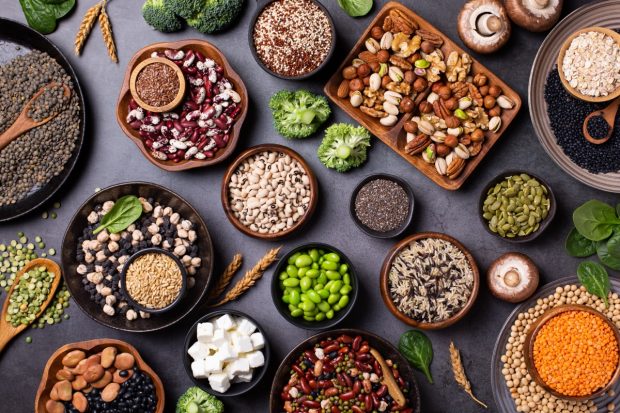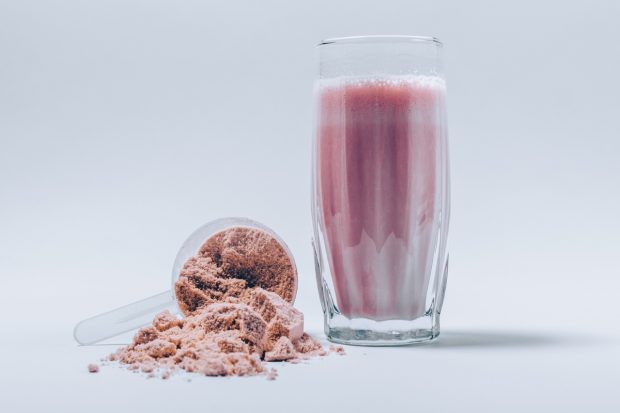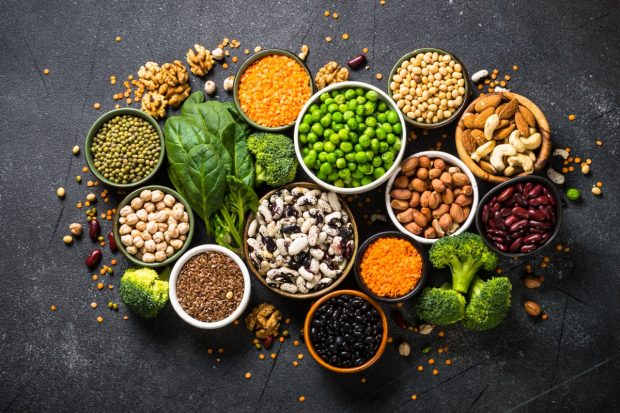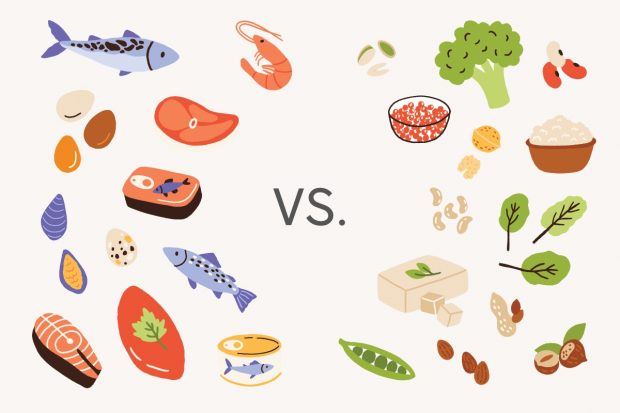Is the misinformation about protein driving you nuts? Yes, whey!

There’s no question—your body needs protein, especially since it’s vital to your health, helping your cells, tissues and organs function properly.
But there’s a lot of discrepancy when it comes to how much your body needs, what form should be consumed (animal versus plant-based) and whether it leads to enhanced weight loss. That, coupled with the fact that protein intake recommendations differ between research groups—some suggest as little as 10% while others recommend up to 35% of caloric intake each day.
The end result? A lot of misconceptions surrounding this powerful macronutrient. To help clear things up, here are 5 protein myths to stop believing and what to do instead.
Myth #1: Protein Supplements Are a Great Way to up Your Intake

There’s no truth in this. Most protein bars and supplements are highly processed, with added sugars, sweeteners, preservatives and a long list of terms you simply can’t pronounce. That, in itself, is a red flag.
The more processed the supplement, the more sluggish you’ll feel. Why? Processed foods disrupt the mitochondria, which slows down how quickly food is turned into energy.
While protein bars and powders are convenient, make sure to check the ingredients label. Look for a short list of ingredients, featuring fruits and nuts along with natural sweeteners like dates or monk fruit. And by all means, make sure sugar isn’t the first ingredient listed. Otherwise, it’s more like a candy bar than a healthy supplement.
What to do instead? Get your protein sources from natural, whole foods. This way, you’ll also get other important nutrients like calcium and fiber.
Related: Do You Really Need to Drink That Protein Shake?
Myth #2: You Can’t Get Enough Protein From Plant-Based Sources

Yes, you can! It’s a common misconception to think that you have to pair certain plant-based proteins with other nutrients (think beans and rice or corn and quinoa) to get a complete protein—one that contains all 9 essential amino acids that your body can’t make on its own.
Instead, eat from a variety of food groups during the day, including beans, nuts and seeds. Eating plant-based sources will meet your daily protein requirements just like consuming animal products will. In fact, one cup of cooked black beans contains roughly 16 grams of protein—about 35% of your daily needs. And edamame, broccoli, bean sprouts, green peas and spinach all contain protein, so eat up.
Myth #3: Eat as Much Protein as You Want

Simply not true! Consuming too much protein may wreak havoc on your health since it raises blood levels and produces high levels of uric acid, a waste product which your kidneys struggle to flush out.
While the keto and Atkins diets are popular, they both consist of increased meat and eggs consumption, which contains high amounts of saturated fat and cholesterol. Overconsumption of these two protein sources may lead to heart disease and cancer.
According to recent studies, plants are the best way to get protein. But no matter where your protein comes from, excess calories from any source leads to weight gain since they’re stored as fat in the body. The only way to counteract this is to create a calorie deficit—burning off more calories than you consume.
Related: The Real Truth on Protein, Carbs and Fat
Myth #4: All Protein Is Created Equal

Protein is made up of building blocks called amino acids. In total, there are 20 different amino acids—nine which are essential, meaning the body needs them to support normal growth, development and function. The other 11 amino acids are nonessential, meaning the body can make them.
Complete proteins—meat, fish, poultry, eggs and dairy—contain all nine essential amino acids, while most plant-based sources are incomplete. However, eating a wide variety of plant-based protein sources—beans, grains, seeds and nuts—per day will provide enough complete protein.
Plant-based protein sources additionally offer ample dietary fiber, vitamins, minerals and other nutrients that your body needs. Plus, plant-based diets are associated with increased life expectancy. How cool is that?
Myth #5: Reduced Protein Intake Leads to Rapid Weight Loss

Definitely a myth. The consumption of protein helps keep you fuller for longer periods of time. If you eat less protein, you might find yourself snacking more, which may lead to weight gain.
When you go on a low-protein diet, you may initially experience rapid weight loss, but it’s often associated with the loss of muscle mass rather than fat.
Because protein plays such a vital role in so many bodily functions, a reduction in this vital macronutrient isn’t the wisest option. But this doesn’t mean you should overconsume either.
Shoot for around 25 to 35 grams of protein per day and eat from a variety of food sources. The most important thing you can do for your health is to eat a healthy, well-balanced diet, where the majority of your calories come from natural, whole foods.
Takeaway
From staying fuller for longer periods of time to reducing food cravings and aiding in recovery, there’s no question that protein has a huge range of benefits that are vital for your health and well-being. So, try to include a protein source at every meal and eat from a balanced plate consisting of a variety of foods.
Discover protein-packed recipes in the Gymondo app, plus offline shopping lists to make grocery shopping that much easier. Start your 7-day free trial today and explore 1000s of healthy recipes and 100s of workouts to build lean muscle.




Kommentar schreiben